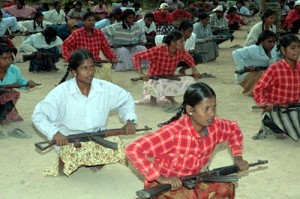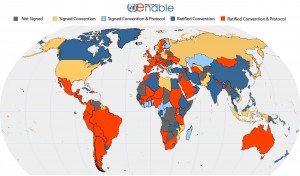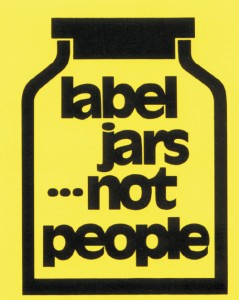In my last post I discussed the general global issue of child soldier exploitation. When child militarism is discussed, the spotlight is usually directed at the experiences of boys. However, out of the estimated 300,000 children exploited in armedgovernmental and rebel forces, about 30% are female. Due to social, cultural, political, and religious factors in …
Tag: best practices
May 20
The CRPD: What’s missing?
In my earlier post I offered some background information about the UN Convention on the Rights of Persons with Disabilities (CRPD), including its history and purpose. I wrote the piece in recognition of the 100th ratification of the treaty last week, but it’s important to understand that ratifying is simply the first step. The hard …
May 19
Preventing Disaster in India
Despite Japan’s current nuclear crisis resulting from the earthquake in March, there are plans to build another nuclear power plant in Jaitapur, an earthquake-prone area on the west coast of India. This isn’t just your average nuclear plant, either – the proposed 9900-megawatt plant will cover 968 hectares of land (that’s more than two thousand …
May 18
Reducing Energy Consumption – Its Not Just For Hippies
Ecotourism has become something of a buzzword lately, but how many people can honestly say they know what it is or how to be a responsible tourist? The International Ecotourism Society is a good place to start learning about sustainable tourism andhow anyone can green their next vacation. Founded in 1989, TIES has long set the …
May 17
The Importance of US Military Withdrawal from Iraq
Until recently, there was little reason to doubt that the 2008 Status of Forces Agreement (SOFA) between the US and Iraq would be honored and all US forces would be out of Iraq by December 31st, 2011. As the deadline nears, the agreement is being called into question. This is a mistake. Withdrawing US forces …
May 16
UN Enable: Celebrating the 100th Ratification of the CRPD!
On May 10, 2011 Columbia became the 100th country to ratify the United Nations Convention on the Rights of Persons with Disabilities (CRPD). The event is a majormilestone for the treaty, as it demonstrates how quickly progress was made in spreading its message across the international community after it entered into force in 2008. To …
May 16
Reading Comprehension and People Comprehension
In the education system in the U.S., so many resources are utilized in order to teach children how to read. Starting in our early elementary years, various skills and tools are drilled into our heads to enable literacy. From memorizing the alphabet to understanding grammar rules to practicing reading comprehension skills, the education system ensures …
May 13
Breaking the Culture of Individualism
In my previous post, “Labeled Disabled”, I highlighted the divisions among isolatedinterest groups in American society. Continuing along this vein, I will explore an alternative approach that could potentially break the stigmas attached to disability in our society. American society has always nurtured its “rugged individualism” and its proudly independent character. We take pride in …
May 13
Serve, Honor, Protect, and Abuse?
International Humanitarian Law (IHL) prohibits all forms of human rights violations, including human trafficking, slavery, torture, and other means of inhumane treatment. Yet, there is a correlation between the deployment of United States military, peacekeepers, and humanitarian aid workers to post-conflict regions and an increase in the trafficking of women and children. By trafficking, I …
May 11
Seeking to Combat Child Sex Tourism
A Focus on Federal Legislation Human trafficking is a persistent international and domestic problem and crime, which is bound in violations of human rights, labor, and public health standards. The definition of human trafficking varies from source to source; however, there are common entities to its overall meaning—victims of trafficking include those who are recruited, …












